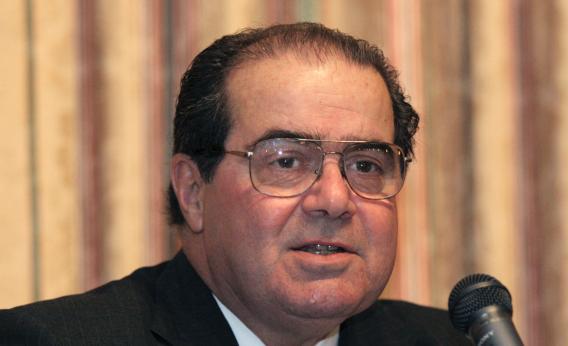“Words do have a limited range of meaning, and no interpretation that goes beyond that range is permissible,” Antonin Scalia said in a speech at Princeton University in 1995. But as the Supreme Court’s most flamboyant wordsmith, Justice Scalia routinely pushes the boundaries of vocabulary, metaphor, and hyperbole. In an enraged dissent in today’s ruling that struck down the Defense of Marriage Act, Scalia added to his 27-year history of bold rhetorical flourishes, railing that the court’s “jaw-dropping” decision has its “diseased root” in its own hubris and “black-robed supremacy,” etc. In honor of this classic dissent, we have compiled a starter glossary of Nino-isms, culled from the 77-year-old justice’s most famous opinions; Scalia-watchers should add their favorites in the comments.
Argle-bargle (n.) Majority opinion that struck down the Defense of Marriage Act. (United States v. Windsor, 2013; see also use of tutti-frutti in Sykes v. United States, 2011)
Bulldozer (n.) Mechanical form of the court’s fantasy that students may feel coerced to participate in school-led prayers; its metaphorical upright blade clears ground for “social engineering.” (Lee v. Weisman, 1992)
Cheek (n.) Misappropriated authority by which the court struck down DOMA. (ibid.)
Cheops’ Pyramid (n.) Architectural form of the court’s “judicial arrogance” on Miranda rights. (Dickerson v. United States, 2000)
Fairyland castle (n.) Architectural form of the court’s fantasy that the Constitution places restrictions on law enforcement, specifically pertaining to the right of the accused to have counsel present during interrogation. (Minnick v. Mississippi, 1990)
Homosexual sodomy (n.) A same-sex relationship. (United States v. Windsor)
Interior decorating (n.) “A rock-hard science compared to psychology practiced by amateurs.” (Lee v. Weisman)
Kulturkampf (n.) A modest attempt by Coloradans “to preserve traditional sexual mores against the efforts of a politically powerful minority,” mistaken by a majority of the court “for a fit of spite.” (Romer v. Evans, 1996)
Lynch mob (n.) Epithet commonly used by proponents of marriage equality to describe DOMA’s supporters.* (United States v. Windsor)
Mansion (n.) Architectural form “constructed overnight” by Roe v. Wade, which “must be disassembled doorjamb by doorjamb.” (Webster v. Reproductive Health Services, 1989)
Monster (n.) Zombie-like corporeal form of the court’s three-part criteria, also known as the “Lemon test,” for evaluating government action related to the establishment clause. (Lamb’s Chapel v. Center Moriches Union Free School District, 1993)
Nietzschean (adj.) Of, like, or referring to German philosopher Friedrich Wilhelm Nietzsche, who foresaw the Supreme Court as an “imperial judiciary.” (Planned Parenthood v. Casey, 1992)
Officer Krupke (n.) Protagonist of Justice Scalia’s dissent in Chicago v. Morales. (1999)
Philippics of Demosthenes (n.) Historical precedent for the court’s fantasy that U.S. Senate floor speeches are well-attended. (Hamdan v. Rumsfeld, 2006)
Platonic golf (n.) Perfect but elusive version of golf that the court assigned itself to define when it ruled that the PGA must allow a disabled golfer to ride in a cart. (PGA Tour v. Martin, 2001)
Spirits from the vasty deep (n.) Pool of job applicants, via Shakespeare. (Johnson v. Transportation Agency, 1986)
Stupid (adj.) What young people are not, which is why they won’t pay for health insurance. (Oral arguments, National Federation of Independent Business v. Sebelius, 2012)
Correction, June 27, 2013: This article originally defined the Scalia-ism “lynch mob” as an epithet used by opponents of marriage equality. Scalia employs it as an epithet used by proponents of marriage equality. (Return to the corrected sentence.)
